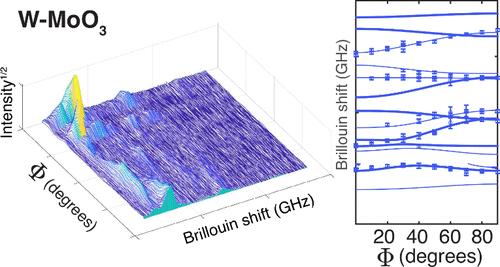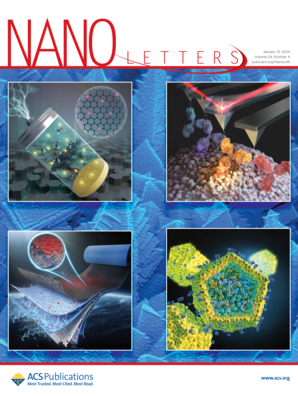互掺 MoO3 中的化学变色和可调谐声子:Ag-、Bi-、In-、Mo-、Os-、Pd-、Pt-、Rh-、Ru-、Sb- 和 W-MoO3
IF 9.6
1区 材料科学
Q1 CHEMISTRY, MULTIDISCIPLINARY
引用次数: 0
摘要
几种元素(Ag、Bi、In、Mo、Os、Pd、Pt、Rh、Ru、Sb 和 W)的互掺被用于化学改变二维层状 α-MoO3 的各种特性。通过布里渊散射测量,插层改变了声子和弹性常数。夹杂改变了电子带隙、颜色、结构、拉曼位移和电子结合能。插层物使氧化钼的颜色从透明变为明亮的蓝色(In、Mo、Os 和 Ru)和橙色(Ag),证明了光学化学变色作用。研究了材料特性之间的相关性。有证据表明,面内纵向刚度 c11 与带隙的变化有关,而各种拉曼模式似乎与各种特性有关,包括剪切模量 c55、钼结合能、晶格常数和插层的优选晶体结构。这些结果表明了令人惊讶的复杂程度,表明了多种不同机制之间的竞争以及涉及特定插入物种类的相互作用。本文章由计算机程序翻译,如有差异,请以英文原文为准。

Chemochromism and Tunable Acoustic Phonons in Intercalated MoO3: Ag-, Bi-, In-, Mo-, Os-, Pd-, Pt-, Rh-, Ru-, Sb-, and W-MoO3
Intercalation of several elements (Ag, Bi, In, Mo, Os, Pd, Pt, Rh, Ru, Sb, and W) is used to chemically alter a wide range of properties of two-dimensional layered α-MoO3. Intercalation modifies acoustic phonons and elastic constants, as measured with Brillouin scattering. Intercalation alters electronic bandgaps, color, structure, Raman shifts, and electron binding energies. Optical chemochromism is demonstrated with intercalants changing the color of MoO3 from transparent to brilliant blue (In, Mo, Os, and Ru) and orange (Ag). Correlations are investigated among material properties. There is evidence that in-plane longitudinal stiffness c11 correlates with changes in the bandgap, while various Raman modes appear to be connected to a variety of properties, including shear modulus c55, Mo binding energies, lattice constants, and the preferred crystal structure of the intercalant. The results indicate a surprising degree of complexity, suggesting competition among multiple distinct mechanisms and interactions involving specific intercalant species.
求助全文
通过发布文献求助,成功后即可免费获取论文全文。
去求助
来源期刊

Nano Letters
工程技术-材料科学:综合
CiteScore
16.80
自引率
2.80%
发文量
1182
审稿时长
1.4 months
期刊介绍:
Nano Letters serves as a dynamic platform for promptly disseminating original results in fundamental, applied, and emerging research across all facets of nanoscience and nanotechnology. A pivotal criterion for inclusion within Nano Letters is the convergence of at least two different areas or disciplines, ensuring a rich interdisciplinary scope. The journal is dedicated to fostering exploration in diverse areas, including:
- Experimental and theoretical findings on physical, chemical, and biological phenomena at the nanoscale
- Synthesis, characterization, and processing of organic, inorganic, polymer, and hybrid nanomaterials through physical, chemical, and biological methodologies
- Modeling and simulation of synthetic, assembly, and interaction processes
- Realization of integrated nanostructures and nano-engineered devices exhibiting advanced performance
- Applications of nanoscale materials in living and environmental systems
Nano Letters is committed to advancing and showcasing groundbreaking research that intersects various domains, fostering innovation and collaboration in the ever-evolving field of nanoscience and nanotechnology.
 求助内容:
求助内容: 应助结果提醒方式:
应助结果提醒方式:


